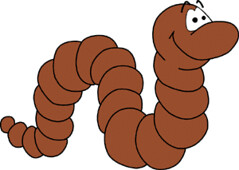
10 out of 10 Worms Agree!
I went into this summer with the best intentions but between battling groundhogs in the garden, 4 jobs and a new gig wine writing for the Montreal Gazette, little time was left for this little labour of love.
So I will start slow and in fact allow someone else to fill the content. The following is one of 24 comments I have recieved on a post about bio-dynamics. I strongly urge you to go back to the original post and follow the thread as it shows how controversial and emotionally charged this issue has become (especially when one considers how many new converts there are to bio-dynamics).
So take it away 'Dave.'
Woooo, I'm a bit late to the table here, but can't resist the temptation to comment. I'm a new user, call me Dave. I have several areas to comment on, let's start with the 6 year study that showed no differences between BD (bio-D) and organic. There were indeed no statistically significant differences in nutrient content, physical characteristics or biological life/processes in the soil between the organic and BD. What doesn't show up in that quote, a single year composting trial did result in statistically different, 30% better nutrient retention in the compost which was made using BD preparations over the compost made from the exact same starting material that did not have the preparations added. I echo some of the other posters skepticism regarding the preparations, yet I do farm biodynamically, and this result astonished me.
Continuing, an unpublished experiment by Reganold's research team was rather unconventional. A rectangular box was constructed. One side of the box contained soil removed from the BD section of the vineyard in the 6 year study, the other half contained soil from the organic section of the vineyard. Worms were collected from the entire vineyard, both organic and BD areas, and then the worms were placed in the box in between the two different soils. The next day the researchers came back and noted that all of the worms had moved into the BD soil. There were no worms in the organic soil. The point? Though modern scientific techniques could find no significant differences in the soils, a bunch of "lower" life forms were unanimous in their selection; we cannot, with current technologies, always find the answers.
Further, to the point of what is the difference between organic and biodynamic. If you are a VERY good organic farmer, there is very little difference, just the preparations, the calendar (these two being the rituals?), and an emphasis on limited inputs. However, you can be organic these days and still farm with the mindset of a conventional grower, i.e. instead of creating a diverse farming agroecosystem that mimics nature (good organic), what organic pesticide can I spray that will kill my pest organism (bad organic)? Organic pesticides are getting better and better my friends, to the point that the farming style can be very similar to a conventional grower. Thus, being BD automatically puts you on the extreme "good organic" side of the spectrum. People generally associate BD with the preparations and all of the wackyness that entails; however, it is based on very good farming technique. We like to say that the preparations are the icing on the cake; should you not have good farming practices in place, your cake will still be worthless even though you've got great frosting.
So, Mithrandir et al., don't get all bent over the preparations, yes they are weird, but they are a small part of the final product. I was offended by Mithrandir's supposition that science is the end all beat all authority. I have worked as a researcher in universities; never forget that most of your science is paid for with grants from large companies to either get a profitable product, or test a potential profitable product. Mysticism? Try looking at it from another viewpoint, try looking at it as farming techniques that work, passed from generation to generation. Why plant on a particular lunar phase? Has it been proven to work at a university? Perhaps it has been studied, I did not check. But usually, if there is no profitable product at stake, thus no scientific inquiry. Reganold was questioned by many of his peers regarding that 6 year study in the vineyard, they basically thought he had committed professional suicide. Believe me, I'm not saying that this true for every, or even the majority of the BD practices (or reasons for scientific studies for that matter), but some BD practices that may be thought of as mysticism certainly fit here.
I am a BD Skeptic that practices BD viticulture. Very little of my farming is centered on the preparations. It is more about how I can grow a balanced vine with very limited inputs (which is a basic part of BD by the way, but not organic). Thus, the resultant fruit is of high quality and representative of the soil in which it is grown rather than the organic inputs (fertilizers, insecticides, fungicides) that I can use. THAT is what is most important about being BD to me.
Caveman, I'd love to hear what came of your investigations on that post about Randall Grahm...
(And I am still waiting too........................!..caveman)